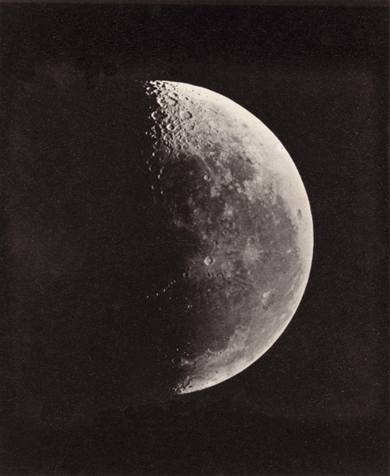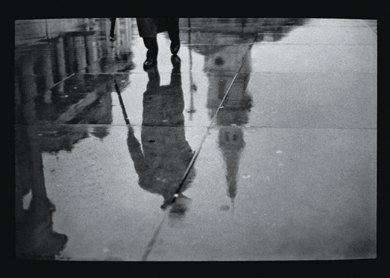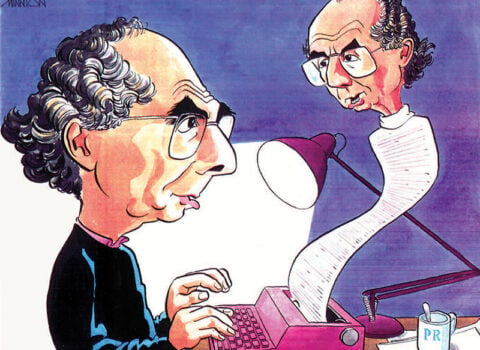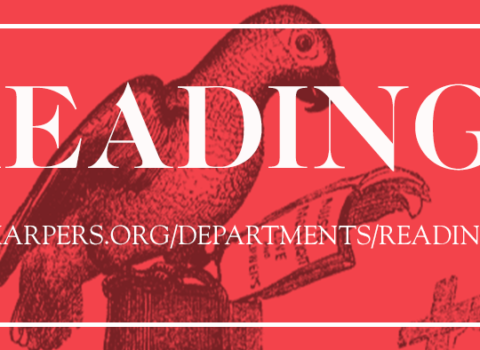The horseman among myrtles, the four horns and four carpenters, the measuring line, the candlestick and two olive trees, the flying scroll, the women and the ephah, the four chariots: these were the eight visions offered to Zechariah, penultimate of the Minor Prophets, and together they are an allegory for the rebuilding of the First Temple after its razing by Nebuchadnezzar II. The Book of Zechariah — one of the few canonical texts that most scholars agree was written by a single author — opens with two questions: “Your fathers, where are they? and the prophets, do they live for ever?” These questions are rhetorical, of course, not least because God is doing the asking. The fathers are in Babylonian exile, or dead, and the prophets are mortal, too, and, as always, unheeded.
Your Fathers, Where Are They? And the Prophets, Do They Live Forever? (Knopf, $25.95) is also the latest novel by the High Priest of High Pathos, Dave Eggers — the belated heir to Zechariah, a Jeremiah with an agent, an Ezekiel on deadline. God had the good sense to call the earth He created merely “good,” and even His translators went with “Genesis” for a title, while Eggers called his 2000 debut A Heartbreaking Work of Staggering Genius. But then he’s always had an aggrandizing streak. Eggers’s memoir of raising his brother after their parents died of cancer sold so well that his follow-up, You Shall Know Our Velocity! (not “Thou Shalt,” but close), published two years later, was a novel about a pair of young Americans traveling the globe giving away their money. What Is the What was the biography of the childhood of a Sudanese refugee named Valentino Achak Deng (though it was marketed as autobiography because Eggers’s technique was to replicate Achak’s voice). Zeitoun was another phatic piece of non-fiction, this time about a Syrian-American housepainter in New Orleans dealing with the damage of Hurricane Katrina and his wrongful arrest by the National Guard for looting. A Hologram for the King returned to fiction, and returned abroad, for a meditation on the American appetite for oil, prospected for by an expat management consultant in Saudi Arabia. The Circle was a novel about the Internet whose blazing message was: Beware the Internet, YOLO. Five major books in a decade: factoring in the forty years wandering the desert, not even Moses wrote his that fast.
Your Fathers is an allegory or an anagogy — or a dialogue, say, because it’s written entirely in dialogue. Thomas is a thirty-four-year-old man-child who gives meaning to his unremarkable life by kidnapping Kev, his college TA from Intro to Aerospace Engineering, who went on to become an astronaut. When Thomas can’t find out why Kev never made it onto a shuttle, and further why NASA has stopped going to the moon and preparing to colonize Mars, he kidnaps Congressman Dickinson, an amputee Vietnam vet. The abductions, like sons in a list of biblical begets, continue: Mr. Hansen, Thomas’s sixth-grade teacher at Miwok Middle School, who resigned amid accusations of molesting male students; Thomas’s mother; Frank, a cop who shot Thomas’s friend Don Banh; the director of patient access at the hospital at which Don Banh died. All are tasered and/or chloroformed and taken to Thomas’s black site, Fort Ord, a decommissioned military installation on the Monterey coast. Thomas meets the last of his victims down on the beach — a woman named Sara, who makes the mistake of resisting his bid to hold hands. These six abductions happen over the course of a night and a day, the same length of time in which Zechariah received his visions.
Thomas intends to find out why he isn’t successful like Kev: Is it because women like Sara always ignored him? Or because Don Banh, on drugs and waving a steak knife around his own back yard, spooked Officer Frank et al. into pumping him full of bullets (seventeen, to be exact)? Or because Mr. Hansen, who held student sleepovers at his house, liked to play a tailoring game that involved measuring Thomas’s inseam? But Mr. Hansen, who admits to Thomas that he was attracted to his students, swears that he never molested them in any penetrative sense. He invited them over because he was lonely and bored. Thomas’s mother concedes that she struggled with booze without a husband around, but insists that her son was always responsibly supervised and provided for.
Ultimately, Thomas’s scattershot assignation of guilt becomes a demand — all kidnappers should have one, along with an escape plan and an alias. Thomas calls for the reform of America’s young men — rather, he calls for America to accommodate the natural violence of its young men in a system other than the military. As he says in a dialogue with the congressman:
—What they don’t realize is that we need something grand, something to be part of.
—And the Shuttle was that for you?
—I don’t know. Maybe the Shuttle was some dumb fucking space glider. But now it’s dead and Don’s dead and Kev is chained to a post. Fuck it. And you know what? What’s really pathetic about Don being shot by twelve cops in his backyard? It meant nothing to no one. He was no martyr, he died for no ideals. And the only thing worse than the silencing of a martyr, a real martyr — someone with dangerous ideas — is silencing someone who has nothing at all to say. Don wasn’t opposed to anything but himself.
—I’m sorry to hear about all this, Thomas.
—But this will keep happening. You know that, right? If you don’t have something grand for men like us to be part of, we will take apart all the little things. Neighborhood by neighborhood. Building by building. Family by family. Don’t you see that?
—I believe I do.
—Who says we don’t want to be inspired? We fucking want to be inspired! What the fuck is wrong with us wanting to be inspired? Everyone acts like it’s some crazy idea, some outrageous ungrantable request. Don’t we deserve grand human projects that give us meaning?
Rhetorical question? Guantánamo spin-off? Abu Ghraib goes Oprah? Thomas proposes digging canals, erecting bridges. He tells the congressman: “You of all people should have known that we needed a plan. You should have sent us all somewhere and given us a task.” Eggers, Gen X’s literary liberal, betrays a pre-boomer credulity in this suggestion that Big Government can become a means of Big Empowerment. Of course, this might just be Thomas’s opinion, but Eggers endorses it by having the congressman agree. So, hearken unto Dave, you stiff-necked masses: if the world doesn’t find a use for its perpetual children, they will destroy it. They might even do so by writing novels.
The titular letter in Daniel Kehlmann’s F (Pantheon, $25.95) stands for Fate. Or Forgery. Or Father. Or Family. It’s also the name of the antihero of one of the umpteen novels within this novel, My Name Is No One, who is called only F. And finally it’s the last initial of the author of My Name Is No One, Arthur Friedland, a frustrated writer who takes his three sons to a kiddie show by a gimcrack hypnotist known as the Great Lindemann, whose spell causes Friedland to abandon that family for his work and, resultantly, international fame. Whether the Great Lindemann actually became, this once, an effective hypnotist or whether Friedland was just seeking a convenient opportunity to hit the road remains a question:
And could it be that Arthur’s answer to the question of why he had walked out on [them], was that anyone who gave himself over to captivity and the restricted life, to mediocrity and despair, would be incapable of helping any other human being because he would be beyond help himself, succumbing to cancer, heart disease, his life cut short, rot invading his still-breathing body?
Kehlmann’s third novel, in a casually virtuosic translation from the German by Carol Brown Janeway, attempts an answer by detailing the adult crises of Friedland’s brood. Martin grows up to be lonely, obese, and a priest despite his atheism. He’s a man compelled to love, but unable to love, a Heavenly Father who can’t be seen, heard, or touched. Ivan becomes an artist and critic who finds himself struggling against the entire patrilineage of Western painting. Ivan’s identical twin, Eric, becomes a businessman preoccupied by the paranormal and occult, as well as a disdainful patron of a contemporary-art market saturated by Fakes and Frauds. Interspersed with the sons’ first-person reminiscences are selections from the shadow oeuvre of Friedland père.
My Name Is No One is a troubling text, according to Kehlmann’s summary:
F is home, looking out at the rain, puts on a jacket and cap, takes his umbrella, leaves the house, wanders through the streets, where it isn’t raining, puts on a jacket and cap, takes his umbrella, and leaves the house, as if he hadn’t just done that already.
Friedland’s second book, The Hour of the Hunter, is a “superficially conventional thriller about a deeply melancholic detective who, despite his vast intelligence and desperate efforts, is unable to solve an apparently simple case.” The Mouth of the River concerns a man “whose fate branches out again and again, depending on different decisions or the whims of Fortune. Each time the two alternatives are explored, the two paths that life can take from the same event.” Each corresponds to the life of a Friedland son, and the cumulative effect suggests — no spoilers — that all existences are but the product of absent, foreign fathers.
Fictions within fictions, let’s talk: Joan Rivers’s Diary of a Mad Diva (Berkley, $26.95) is obviously not Joan Rivers’s diary — or is it? Who’s to say that after so many years in the business of making drunk people laugh by saying funny (racist, sexist, angry) things, she hasn’t had her inmost impressions become just as jokey (or coarsened)? Rivers’s shtick is even older than she is, but it has something of the same plasticity. Punch lines about sagging asses survive because every generation is punched by age and sags.
1/1/2013: Rivers notes that Melissa, her E! and now WE tv co-star, who also plays her daughter offscreen, has given her this blank diary for Jewish Christmas — so typical. Rivers writes:
I give my friends the finest cashmere sweaters or amazing, pure silk Hermès scarves and in return I always get stuff made of “mystery material” with a note that says, “Don’t smoke while wearing this; Richard Pryor did and remember what happened.”
Rivers records other minutiae of 2013 without missing a day: tour dates, red-carpet TV appearances, peddling jewelry on QVC, friends dying. 1/22, the inauguration:
I resent that the networks think we’re so shallow that because the president is black they have to keep doing cutaways only to smiling black people in the audience. If Chris Christie ever becomes president, will they only cut to Melissa McCarthy or Kathy Bates chewing and burping?
2/11: “The United States military announced it will provide the same benefits to same-sex couples as it does to heterosexual couples, which means sexual assault is now legal for the gays, too!” But every day can’t be so momentous. Some are just “driving to Toronto,” “driving to Winnipeg,” “driving to Saskatoon.” On interacting with fans: “Got rid of Facebook today and I feel as free as the woman in the tampon commercial who can go swimming, surfing or cliff diving in spite of her heavy flow.” On a bad gig: “They stared at me the way Mohammed Atta stared at tall buildings.” On taking her grandson to SeaWorld: “As Elie Wiesel likes to say, ‘Never again.’ ”
What’s the point of this journal now that the Internet streams constant updates of “status”? What’s the point of reading the purported pillow book of a woman who was one of the first stars — a Grammy (nominated), a Tony (nominated), an Emmy (won), and a regular spot as Carson’s guest host throughout the 1980s — to join reality TV? Rivers has always been meta-meta: she exploited herself before the cameras exploited her because she had to, because she was a “comedienne,” because she was a woman. And among her most generous roles has been her pitiless shitting on her professionally talentless daughter. She once brought a crew to film Melissa in the bathroom; she dedicated a full episode of Joan & Melissa: Joan Knows Best? to Melissa’s then boyfriend’s addiction to Internet porn. Rivers’s abuse, however, has made Melissa useful, and if Melissa’s too stupid to understand that, her mother is too smart to explain; the sins of the mothers are visited upon the daughters, and blame can beget only blame. As Rivers writes in her 10/7 entry:
I’ve decided my career is in the toilet. I’m an eighty-year-old heterosexual and the only drug I take is Boniva, so I might as well face it: I’ve got no shot at a big-time gig. As a matter of fact, my career is at such a low point that I’m writing this with the burnt end of a match in a bus terminal where I’m waiting for the 2:17 to Kalamazoo where I’m the opening act for a retrospective slide show on Tiny Tim. What did my parents do wrong?
































































































